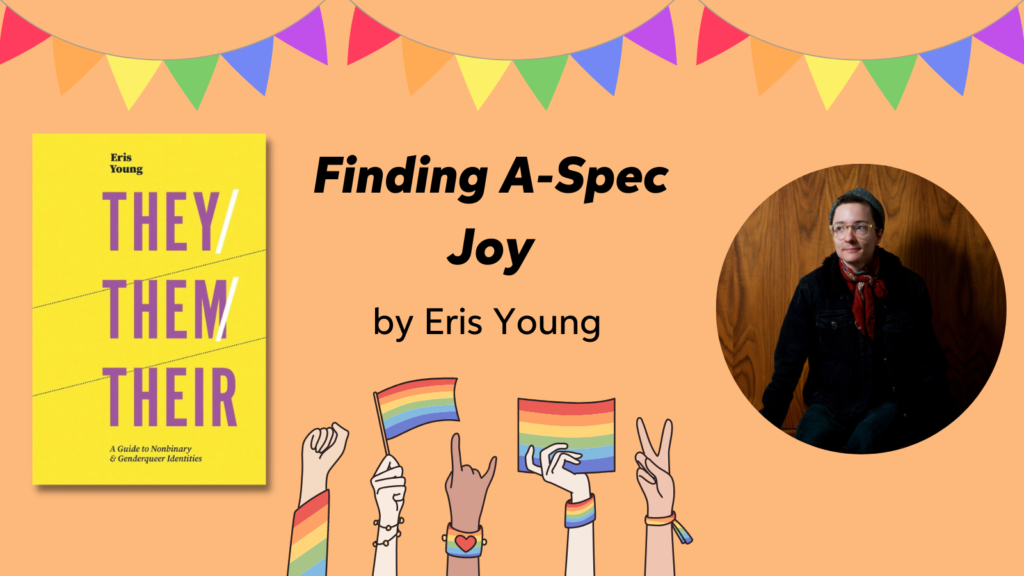
Finding A-spec Joy
Eris Young, author of They/Them/Their and their upcoming book, Ace Voices, publishing in December, shares the difficulties of finding a-spec joy, the importance of challenging stigma, and the necessity of celebrating the beauty and diversity of the LGBTQIA+ community.
Queer joy has been hard to find. When you belong to both the trans and ace-spectrum communities, there can be times where the idea of embracing these identities and finding something to celebrate in them seems impossible.
This isn’t, of course, because there’s anything wrong with these identities. Quite the opposite, it’s because the rest of the world seems to think that being in these communities is to live a life of lack, isolation, misery, repression, or illness– and it’s the rest of the world that so often tells us how to feel about ourselves. This means that queer joy is something I have had to work hard to find for myself. It means that when I was asked to write about queer joy, even knowing what it–what ace and trans joy–looks like, didn’t come easily.
Any time writing the book was difficult…I reminded myself that I was writing as much to help myself as my community, and that if I was able to remind people –especially a-spec people themselves –that they are loved, that there is joy to be found in the community and the people in it, then it was worth it”
My new book, Ace Voices, especially focuses on a community that is almost never celebrated, never allowed to feel joy. Even the possibility of being joyfully ace, aro or ace-spectrum seems beyond the ability of most allos (non-ace-spectrum people) to comprehend. Many people seem to think that if you’re not striving to enter and maintain romantic relationships, if you’re not enthusiastically embracing sex, what joy could there possibly be in your life?
So while I was writing Ace Voices, that perception of inherent misery associated with being aromantic or asexual was very much at the front of my mind. It was an attitude I’d been conditioned to have by a sex- and romance-obsessed society, a society that devalues friendship and sees any kind of “alternative” intimate bond as at best second-rate, and at worst downright degenerate. It’s an attitude I have had to work hard to let go of not only so I could write the book I needed to write, but also so I could live my life without shame.
So my desire, my need, to challenge the stigma around being on the ace spectrum fundamentally shaped my writing process. I wanted to use Ace Voices to do what I saw as community action: to unequivocally assert that ace and aro lives are worth living, and to celebrate the singular beauty and diversity of my community.
“Finding a-spec joy felt like a new and necessary conversation, one I could see was only just beginning. It was a conversation I knew I wanted to be a part of.”
I wanted to celebrate the way so many of us have discarded the language, relationships and attitudes we’ve been given, and created our own. The way our communities have been, since their beginnings, radically egalitarian spaces, where no one person decides what the words we use mean, where no one tells us how we’re supposed to feel, and, at the best of times, where no one is excluded because their experience doesn’t fit the template for what an a-spec life is supposed to look like– because there is no template.
While I did have to talk about the ways people in my community are marginalised, pathologised, oppressed or made invisible, because those are unfortunately still a part of most a-spec lives,
I also wanted to shift focus away from the “bad things.” Finding a-spec joy felt like a new and necessary conversation, one I could see was only just beginning. It was a conversation I knew I wanted to be a part of.
When I was writing about my own experiences, and those of the people I spoke to while doing research, I tried to foreground the unique ways a-spec people see the world, the communities and relationships we’re building for ourselves. I wanted to highlight what I had come to see as the quintessentially “ace humour” in my interviewees’ words, and the things they themselves said they liked about being a-spec.
And any time writing the book was difficult, any time I was feeling burned out or weighed down by impostor syndrome, I reminded myself that I was writing as much to help myself as my community, and that if I was able to remind people–especially a-spec people themselves–that they are loved, that there is joy to be found in the community and the people in it, then it was worth it.
They/Them/Their is available at JKP.com or wherever you buy books. Get 25% off using discount code JKPPRIDE25 at checkout, offer only on JKP.com, valid until the end of June.
If you would like to read more articles like this and get the latest news and exclusive offers on our books about gender diversity and sexuality, why not join our mailing list? You may also be interested in our Twitter page or Instagram.